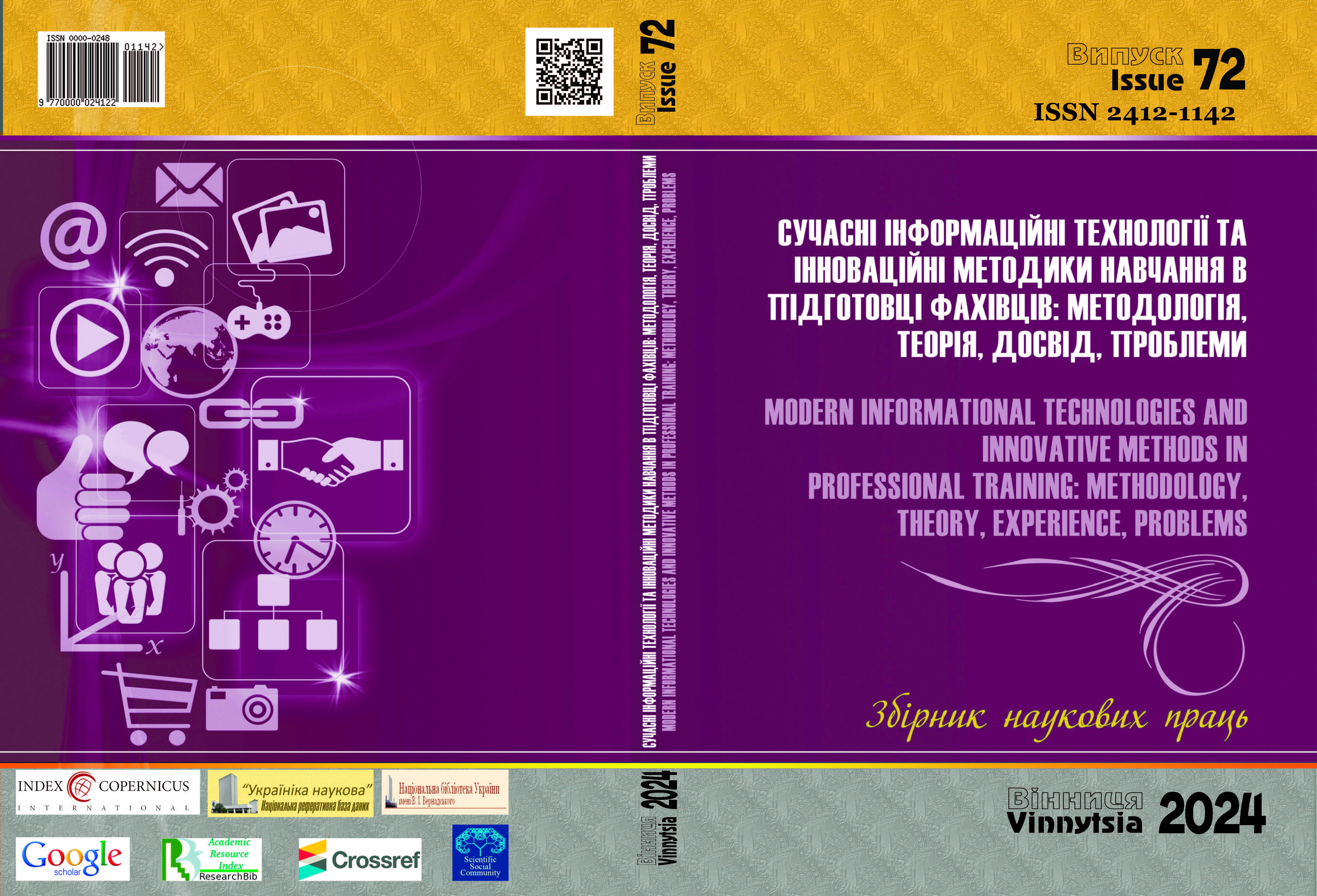WAYS OF INTENSIFYING STUDENTS’ INDEPENDENT LEARNING IN THE PROCESS OF MASTERING A FOREIGN LANGUAGE IN HIGHER EDUCATION
DOI:
https://doi.org/10.31652/2412-1142-2024-72-154-161Słowa kluczowe:
independent work of students; self-education skills; higher education; classroom work; motivation; information search; authentic sources of informationAbstrakt
The article is devoted to the organisation of students' independent work in higher education in the process of learning a foreign language. Students' independent work is identified as a key factor in the formation of self-education skills and the ability to learn throughout life. In the course of the study, three independent but interrelated parties involved in the process of self-learning of students were identified: student(s)-teacher-information technologies. It is defined that properly organized independent work of students allows them to process large amounts of information, in particular, to work with authentic foreign language sources in the process of mastering foreign language competence. It is proved that the prerequisites for high-quality independent work can and should be formed in the process of classroom work, which in its turn distinguishes a separate function of classroom teaching: preparation for independent work of students. It is stated that students' independent work cannot be separated from classroom work, since it is in the classroom that the teacher uses pedagogical tools to influence the student in order to increase his or her level of confidence and encourage independence. It is emphasised that the task of face-to-face learning is to form basic knowledge and skills, as well as the necessary potential for independent work of the student in future, while having independent learning. The course “Foreign Language for Professional Purposes” chosen for the study is the basic course in learning a foreign language (English) for students of the Vinnytsia Institute of Trade and Economics of the State University of Trade and Economics, therefore, it has been chosen for our study. Based on the results of a preliminary survey of students, we tested the latest technology for organizing students' independent work called “Puzzles”, which accumulates and presents information on English-speaking countries in various fields. Moreover, the areas of work can be selected from a list or suggested by the student and included in the list. Thus, independent work can coincide with the realisation of students' wishes and interests, which in its turn became a driving emotional factor in student motivation.
Pobrania
Bibliografia
Fitriasari, S. & Fauzi, A. (2022). Independent Learning in the Covid-19 Pandemic Advances in Social Science, Education and Humanities Research, Vol. 636, 523-528. Онлайн.. Доступно: file:///C:/Users/%D0%9E%D0%BB%D1%8F/Downloads/125969103%20(1).pdf (in English)
Nyman F. (2023) Self-Regulated Learning and Its Influence on Student Motivation: A Case Study from the UK. Онлайн.. Доступно: https://hal.science/hal-04232447/document (in English)
Maclellan, E. & Soden, R. (2007). The Significance of Knowledge in Learning: A Psychologically Informed Analysis of Higher Education Students’ Perceptions. International Journal for the Scholarship of Teaching and Learning, 1(1), 1–18. Онлайн.. Доступно: https://doi.org/10.20429/ijsotl.2007.010106 (in English) DOI: https://doi.org/10.20429/ijsotl.2007.010106
Nuthall, G. (2004). Relating classroom teaching to student learning: A critical analysis of why research has failed to bridge the theory-practice gap. Harvard Educational Review, 74(3), 273–306. Онлайн.. Доступно: https://doi.org/10.17763/haer.74.3.e08k1276713824u5 (in English) DOI: https://doi.org/10.17763/haer.74.3.e08k1276713824u5
Pedler, M., Hudson, S. & Yeigh, T. (2020). The teachers’ role in student engagement: A review. Australian Journal of Teacher Education (Online), 45(3), 48–62. Онлайн.. Доступно: http://dx.doi.org/10.14221/ajte.2020v45n3.4 (in English) DOI: https://doi.org/10.14221/ajte.2020v45n3.4
Meyer, B., Haywood, N., Sachdev D., & Faraday, S. (2008). Independent Learning: Literature Review. What is independent learning and what are the benefits for students? London: Department for Children, Schools and Families. Онлайн.. Доступно: http://www.curee.co.uk/files/publication/%5Bsitetimestamp%5D/Whatisindependentlearningandwhatarethebenefits.pdf (in English)
Hockings, C., Thomas, L., Ottaway J., & Jones, R. (2018). Independent Learning ‒ what we do when you’re not there. Teaching in Higher Education: Critical Perspectives, 23(2), 145-161. DOI: doi.org/10.1080/13562517.2017.1332031 (in English) DOI: https://doi.org/10.1080/13562517.2017.1332031
Hadi, S., & Farida, F. (2012). Influence of interest Independence and learning resources towards pretense of learning students on subjects IPS class. Journal Economic Education Dynamics Education, 7(1), 8-13. DOI: 10.15294/dp.v7i1.4913 (in English)
Liutviieva Ya., Savytska L. (2019) Development of students' independent work in the process of learning foreign languages. Ekonomichnyi rozvytok i spadshchyna Semena Kuznetsia: Materials of the International scientificpractical conf. 30-31 May. 2019, Kharkiv, 349-351. (in Ukrainian)
Pratiwi, I. D., & Laksmiwati, H. (2016). Belief selfreliance and independence of learning in high school students State X. Journal of Theoretical and Applied Psychology, 7 (1), 43-49. DOI: 10.26740/jptt.v7n1 (in English) DOI: https://doi.org/10.26740/jptt.v7n1.p43-49
Ernst von Glasersfeld (1989) Cognition, Construction of Knowledge, and Teaching. Synthese (special issue on education), 80(1), 121–140. (in English) DOI: https://doi.org/10.1007/BF00869951
Osaulchyk O. (2018). Organisation of cooperation in the teacher-student system in modern conditions. Aktualni pytannia humanitarynykh nauk, 21(2), 123-126. (in Ukrainian) DOI: https://doi.org/10.24919/2308-4863.2/21.167285
Ivanytska, N., Tymoshchuk, N., Dovhan, L., Osaulchyk, O., & Havryliuk, N. (2021). Effectiveness of Digital Resources in the Learning Management System Within Online Education of Future Enterpreneurs. Journal of Entrepreneurship Education, 24(4). (in English)
Halim, S., Wahid, R., Halim, T., and Farooq, O. (2019). Why Don’t Learners Learn What Teachers Teach? Language in India, 19(1), 277–289. Онлайн.. Доступно: http://www.languageinindia.com/jan2019/shanjidastudentsnotlearnwhatteachersteachfinal.pdf (in English)
Russell, J.M., Baik, C., Ryan, A.T., and Molloy, E. (2020). Fostering self-regulated learning in higher education: Making self-regulation visible. Active Learning in Higher Education, 23(2), 97–113. Онлайн.. Доступно: https://doi.org/10.1177/1469787420982378 (in English) DOI: https://doi.org/10.1177/1469787420982378
Pobrania
Opublikowane
Numer
Dział
Licencja
Prawa autorskie (c) 2024 Ольга Осаульчик

Utwór dostępny jest na licencji Creative Commons Uznanie autorstwa 4.0 Międzynarodowe.





